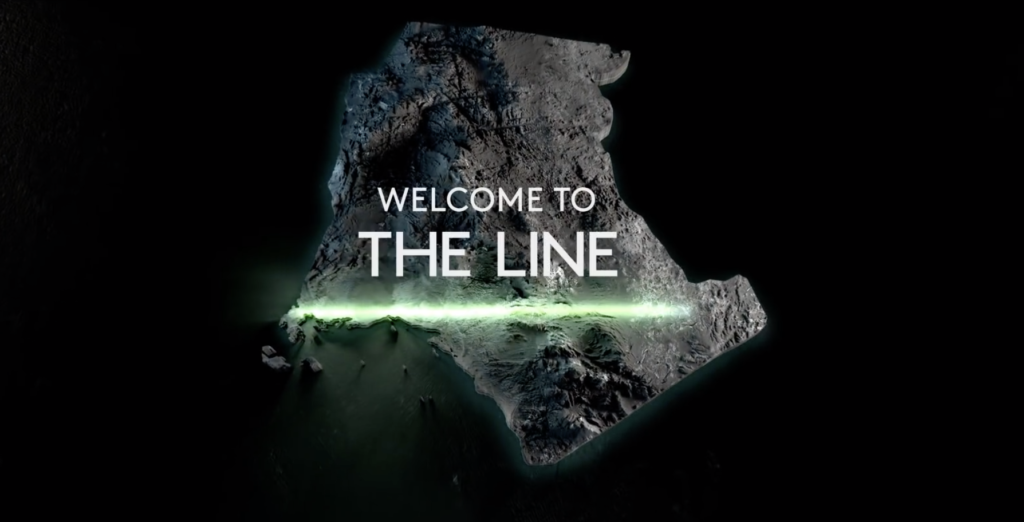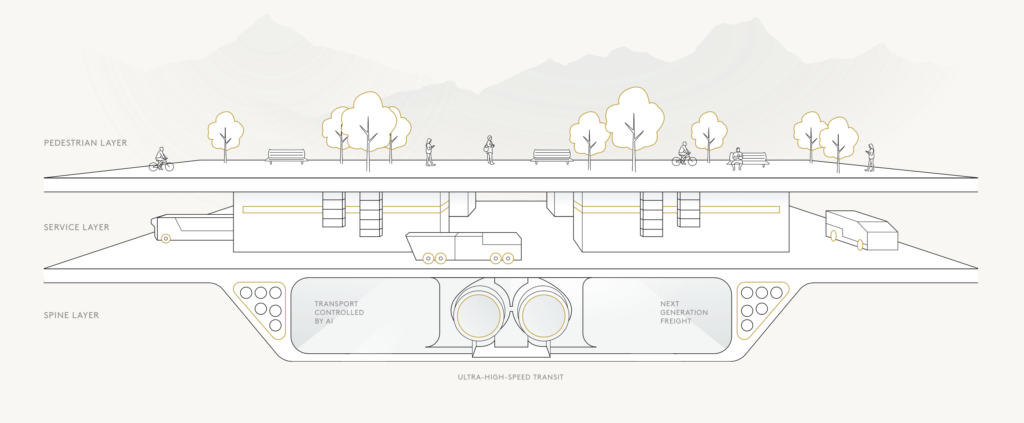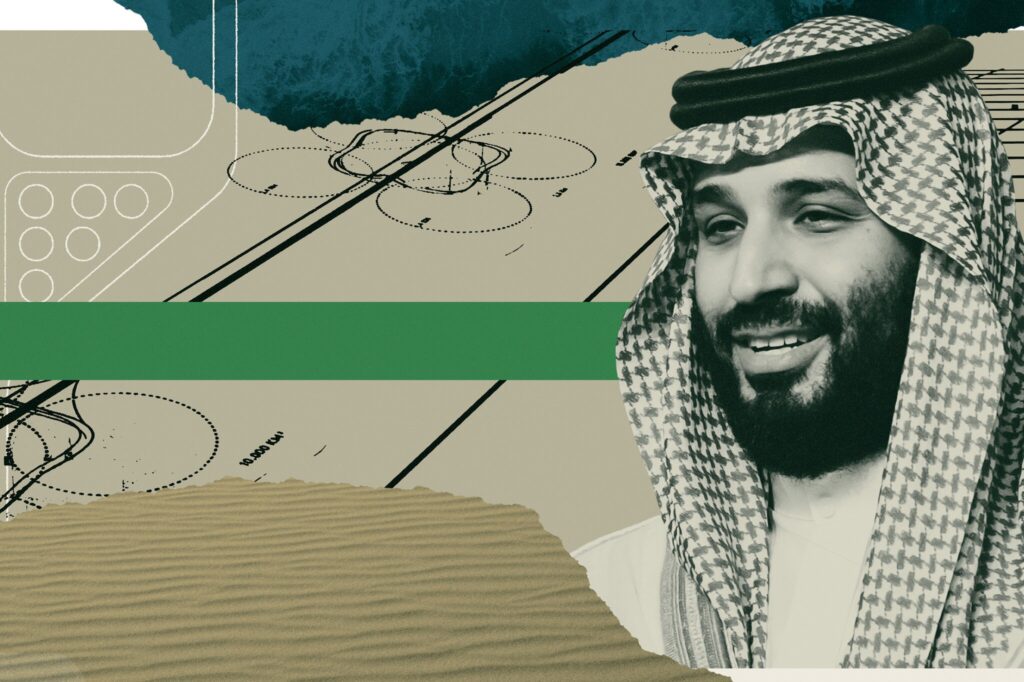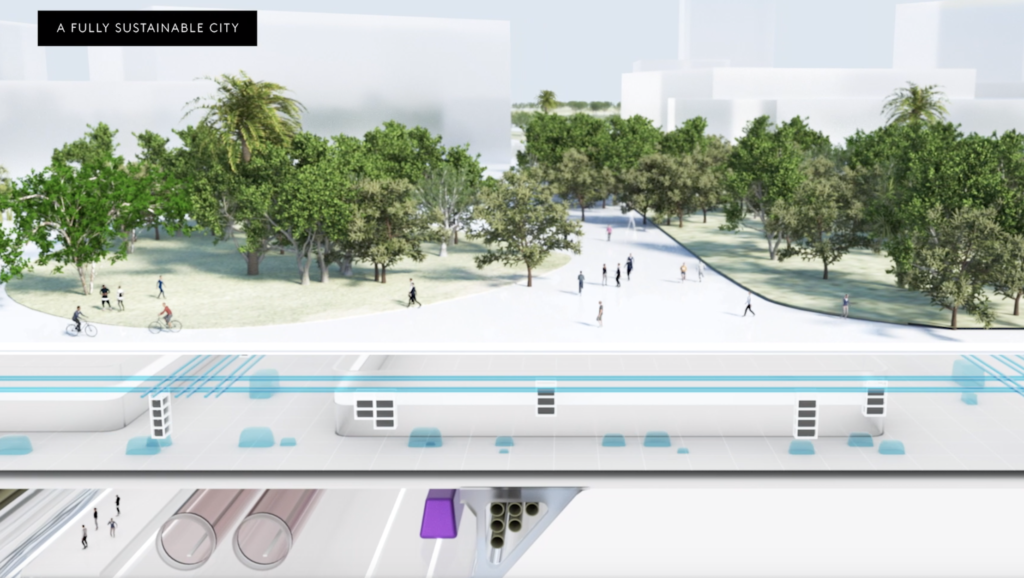What’s The Line
A city with zero carbon emissions, 100% sustainable, self-powered, without roads or cars: the green utopia of Saudi Arabia is called “The Line”.
The megacity will be built on a single straight line, 170km long with the same extension as Belgium. The chosen territory is located in the north-west of the state, between the Red Sea and the Gulf of Aqaba. Today the area is mainly desert, but the massive project aims to make it an oasis of sustainability and multiculturalism. Launched in 2017, this utopian plan is part of the “Vision 2030”, an act that aims to focus the Arab economy on renewable energy, making it a global model.

As explained in The Line’s video presentation, the city will be unique and pioneering. It is no coincidence that the region within which the prodigy will develop has taken the name of NEOM. The first three letters refer to the Greek prefix nέο, that means “new”, forth letter is short for Mostaqbal, Arabic word for “future”.
The ultra-innovation planned for The Line includes a total power supply from renewable sources and free and ultra-fast internet connection in all areas of the city. Transport will use driverless technology with self-driving vehicles, no citizen can or should have a car, because the project ensures that every need will be a maximum of 5 minutes walk. Smart mobility then provides for a commuting of up to 20 minutes.
The other side of the coin is the high-tech gamble. Connectivity, monitoring drones and use of big data. The services will be based on artificial intelligence and facial recognition. Precisely this hyper surveillance has led to skepticism in a slice of public opinion.

Who is behind The Line
The $ 500 billion pharaonic smart city is a creature of the young Saudi prince Mohammed Bin Salman. On video released on the official channels of the project, the prince is who explains how much and how The Line will change the face of the planet. His Royal Highness (as he is defined in the launch announcements), states that by 2030, the city will host 1 million inhabitants. They will be pioneers of a new virtuous civilization in which you will no longer breathe smog, no deaths from car accidents, not pollution. Surreal, utopian, but apparently achievable.

As idyllic as all this sounds, the controversial political and diplomatic situation in Saudi Arabia necessarily shifts the debate from the level of sustainability to that of ethics.
The massive project has in fact suffered a setback following the case Jamal Khashoggi, dissident journalist killed on 2 October 2018 inside the Saudi Consulate in Istanbul. The UN accused “senior Saudi officials, including Crown Prince Mohammad bin Salman” of this murder. When this news broke, some of the 18 international experts on Neom’s advisory board were self-suspended.
The murder of Khashoggi therefore caused several of the most famous architects and engineers in the world to move away from the business. The most striking case was that of the British architect Norman Foster, followed by a note from the Italian Carlo Ratti.
A green utopia that divides
Despite the strained relations with the West, most of The Line’s detractors seem to be among the people of Saudi Arabia. In fact, the most common criticism concerns the request of many citizens to improve the conditions of existing cities, adapting them to the progress of the country, before building a new one.
On Twitter, many users are wondering how it is possible to complete such a monumental design in just 10 years, without further harming the environment during its creation, by placing (literally) a green megalopolis on the desert.

Another crucial point of the construction is that of “evictions”. The New York Times reports the bitter story of the tribal community. They have inhabited the area of the Tabuk province for centuries, which will now be removed to make room for the project. The American newspaper also explains how following a video complaint, one of the members of the Bedouin tribe was shot dead in a clash with the Saudi security forces.
Of course this does not mean that an authoritarian monarchy like Salman’s cannot have revolutionary ideas and excellent in content, but that the form and moral progress still leave something to be desired.
And you? Would you live in a city of dreams, eco-sustainable, protected and surrounded by nature which, while promising to be free and multicultural, is “Made in Saudi Arabia”? If the answer is yes, pack your bags, because you can be part of what will surely be an adventure, from all points of view.





